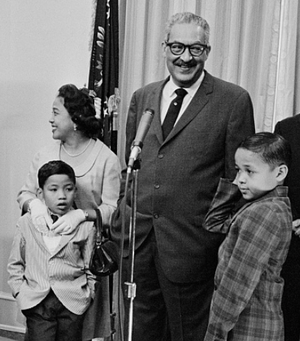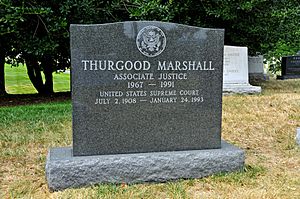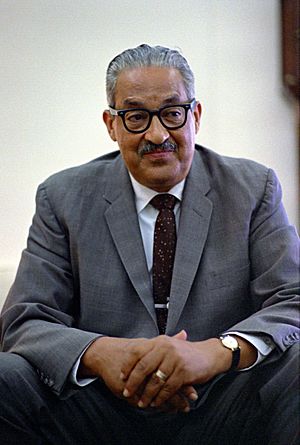Thurgood Marshall facts for kids
Thurgood Marshall (born July 2, 1908 – died January 24, 1993) was an important American lawyer and judge. He was the first African American to serve on the Supreme Court of the United States. Marshall was a Supreme Court Justice from 1967 to 1991. In 1946, he received the Spingarn Medal for his hard work with the NAACP. He was one of the NAACP's best lawyers. He also served as the Solicitor General of the United States, which is a top lawyer for the U.S. government.
Contents
Early Life and Education
Thurgood Marshall was first named "Thoroughgood," which was his grandfather's name. But when he was in second grade, he changed it to the shorter "Thurgood."
He was born on July 2, 1908, in Baltimore, Maryland. His parents were Norma and William Canfield Marshall. His father worked in hotels, clubs, and on trains. His mother was a schoolteacher. When Thurgood was very young, his family moved to New York City to find better jobs. They moved back to Baltimore when he was six years old. As a child, he was full of energy and sometimes got into trouble.
Marshall went to the Colored High and Training School in Baltimore, which is now Frederick Douglass High School. He finished school with high honors in 1925. After high school, he went to Lincoln University in Chester County, Pennsylvania. This was the oldest college in the United States for African Americans. The famous poet Langston Hughes was one of his classmates there.
In 1930, Marshall graduated with honors. He earned a degree in American literature and philosophy. He wanted to study law, but he could not go to the all-white University of Maryland Law School. So, he applied to Howard University School of Law in Washington, D.C., and was accepted. At Howard, he learned a lot from Charles Hamilton Houston. Houston taught his students to be "social engineers." This meant using the law to fight for civil rights and make society better.
Marshall was the top student in his class when he graduated in June 1933. He passed the Maryland bar examination (the test to become a lawyer) later that year.
Legal Career and Important Cases
After law school, Marshall joined the NAACP (National Association for the Advancement of Colored People). He became a very active member. In 1934, he became the director of the NAACP's Legal Defense and Educational Fund. He won his first big civil rights case in Maryland in 1935, with help from Charles Houston.
Marshall became known for winning many cases. He won 29 out of 32 cases he argued before the Supreme Court.
Fighting for Equal Rights
Thurgood Marshall worked on many important cases that changed American law.
- In 1944, Marshall argued in the case of Smith v. Allwright. This case challenged rules that stopped Black people from voting in primary elections. He won, helping to protect voting rights.
- One of his most famous cases was Brown v. Board of Education. This case was about racial segregation in public schools. In 1948, Marshall began fighting this case. In 1954, the Supreme Court decided that racial segregation in public schools was against the law. This was a violation of the 14th Amendment, which guarantees equal protection under the law. This decision was a huge victory for the civil rights movement. It helped lead to schools becoming integrated, meaning students of all races could learn together.
From 1950 to 1951, Marshall also investigated U.S. Army courts-martial in Japan and Korea. He helped African American soldiers who were treated unfairly. In 1961, President John F. Kennedy appointed him to the U.S. Court of Appeals. He continued to win many cases before joining the Supreme Court.
Throughout his life, from 1908 to 1993, Thurgood Marshall fought for the rights of all people. Justice Sandra Day O'Connor, who served with Marshall on the Supreme Court, said he often shared stories during meetings. She realized that his stories usually had an important legal point behind them.
Personal Life

Marshall married Vivian "Buster" Burey on September 4, 1929. At the time, he was a student at Lincoln University. They were married until she passed away from cancer in 1955.
Eleven months later, Marshall married Cecilia "Cissy" Suyat, who was a secretary at the NAACP. They had two sons: Thurgood Jr. and John. Thurgood Jr. became a lawyer and worked for President Clinton. John directed the U.S. Marshals Service and served as Virginia's secretary of public safety.
Retirement and Legacy

Thurgood Marshall did not want to retire from the Supreme Court. He often said he was appointed for life and planned to serve for life. However, he had been in poor health for many years. On June 27, 1991, at 82 years old, he announced he would retire. When asked why he was leaving, he joked, "What's wrong with me? I'm old. I'm getting old and coming apart!"
President George H. W. Bush nominated Clarence Thomas to take Marshall's place. Marshall's retirement became official on October 1, 1991.
His health continued to get worse. On January 25, 1993, he passed away from heart failure at the Bethesda Naval Medical Center. He was 84 years old.
Marshall's body was placed in the Great Hall of the Supreme Court building. Thousands of people came to pay their respects. More than four thousand people attended his funeral service at the National Cathedral. Civil rights leader Vernon Jordan said that Marshall showed how the law could be a tool for freedom. Chief Justice William Rehnquist said that no one did more to make the words "Equal justice under law" a reality than Thurgood Marshall.
Marshall was buried at Arlington National Cemetery.
Interesting Facts About Thurgood Marshall
- Thurgood's father, William, sparked his interest in law. William loved following legal cases, and Thurgood often went to court with him to watch. Marshall later said his father taught him how to argue and prove his points.
- Marshall strongly believed that all people, Black and white, rich and poor, should have equal rights. He worked hard to make this happen in the United States.
- He was against the death penalty. He believed criminals should go to prison instead.
- Marshall was an active member of the Episcopal Church.
- He was also a Prince Hall Mason, which is a type of fraternal organization.
- In 2005, the state of Maryland renamed Baltimore's airport the Baltimore/Washington International Thurgood Marshall Airport in his honor.
- The law library at the University of Maryland is also named after him.
- Other buildings named for Marshall include the 590-foot-high Thurgood Marshall United States Courthouse in New York and the federal judicial center in Washington.
- Many streets and schools across the nation are named after him.
- In 1993, after his death, President Bill Clinton gave him the Presidential Medal of Freedom. This is one of the highest awards a civilian can receive. In 2003, the United States Postal Service issued a special stamp in his honor.
- Thurgood Marshall has been played by famous actors in movies and plays. Sidney Poitier played him in the 1991 TV movie Separate but Equal. Laurence Fishburne played him in the Broadway play Thurgood. And Chadwick Boseman played him in the 2017 film Marshall.
Thurgood Marshall Quotes
- "A child born to a black mother in a state like Mississippi….. has the same rights as a white boy born to the wealthiest person the United States. It’s not true, but I challenge anyone to say it is not a goal worth working for."
- "In recognizing the humanity of our fellow beings, we pay ourselves the highest tribute."
- "Racism separates, but it never liberates. Hatred generates fear, and fear once given a foothold; binds, consumes and imprisons. Nothing is gained from prejudice. No one benefits from racism."
- "The measure of a country's greatness is its ability to retain compassion in times of crisis."
Images for kids
-
U.S. Senator Ben Cardin (left) and Maryland Attorney General Doug Gansler talk in Lawyers Mall, near a statue of Thurgood Marshall. (October 2007).
See also
 In Spanish: Thurgood Marshall para niños
In Spanish: Thurgood Marshall para niños
 | Percy Lavon Julian |
 | Katherine Johnson |
 | George Washington Carver |
 | Annie Easley |





